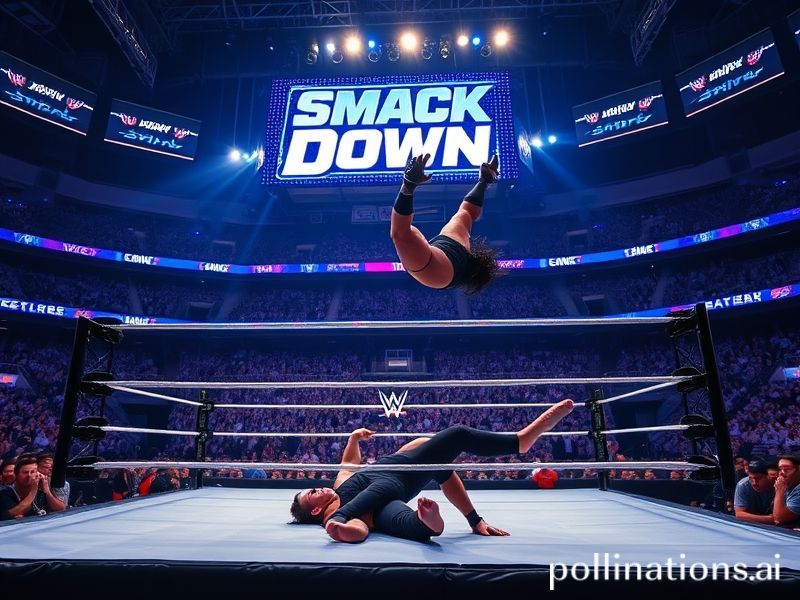Friday Night Geopolitics: How WWE SmackDown Became the World’s Most Effective (and Absurd) Diplomatic Channel
Friday Night SmackDown: The World’s Loudest Diplomatic Cable
By “Ringside” Rami al-Mansour, Senior Correspondent for Dave’s Locker, filing from a hotel bar in Riyadh where the Wi-Fi is faster than U.S. congressional ethics reform
If you happened to tune into WWE SmackDown Live last Friday, you may have noticed something odder than Brock Lesnar’s new haircut: the broadcast opened in Arabic, segued into Spanish for the entrances, and closed in English—right before the Saudi General Entertainment Authority cut to a local ad for camel-milk energy drinks. Welcome to the newest iteration of soft power, where suplexes, steel chairs, and scripted betrayals serve as the lingua franca of a planet that can’t agree on carbon limits but will absolutely agree that Roman Reigns looks smug.
SmackDown’s global simulcast now reaches 180 countries—one more than the United Nations, and arguably with better attendance. In Lagos, a generator-powered viewing party projected the image onto a whitewashed mosque wall; in Manila, jeepney drivers parked under a flyover to watch on a cracked phone taped to a windshield; in Reykjavik, the mayor live-tweeted in four languages, mostly to complain that Rey Mysterio stole his signature mask design. The show is no longer mere television; it’s a weekly diplomatic communique wrapped in spandex, beamed to every time zone where people still believe the next clothesline might actually fix something.
Consider the geopolitics: WWE’s 10-year partnership with Saudi Arabia has turned Friday nights into a rolling foreign-aid package—except the aid consists of Sami Zayn selling knee injuries instead of wheat. Riyadh pays handsomely for these spectacles, laundering reputations the way Ric Flair used to launder blood-stained robes. Meanwhile, the U.S. State Department quietly tallies each body slam as a cultural export, like Boeing jets but with more pyro and fewer congressional hearings. The irony, of course, is that while Washington debates TikTok bans, the most effective American propaganda is a 280-pound man in sequins shouting “Acknowledge me!” to a crowd chanting in unaccented unison.
Europe, ever the moral referee, clutches its pearls. The European Parliament issued a non-binding resolution condemning WWE’s “sportswashing,” then adjourned to watch a pirated stream because Sky Deutschland’s paywall is steeper than the Swiss Alps. In Brussels, officials draft sanctions between segments, tut-tutting while secretly placing prop bets on how many German suplexes Gunther will deliver before the commercial break. The continent that once exported colonialism now imports chair shots; history’s sense of humor remains undefeated.
Latin America, birthplace of lucha libre, watches with the weary affection of an older cousin who invented the dance and now sees it turned into TikTok. Mexico City’s Arena México still sells out, but the kids in Ecatepec wear Logan Paul merch, a development sociologists describe as “post-ironic imperialism.” Argentina, meanwhile, has adopted Charlotte Flair as a feminist icon—apparently nothing says liberation like moonsaulting off the top rope in designer boots.
Asia-Pacific is where the numbers get absurd. India’s JioCinema logs more SmackDown streams than monsoon warnings; analysts credit a population starved for catharsis after realizing their cricket team can’t solve inflation. Japan, ever the perfectionist, live-dubs the show with such gravitas that Shinsuke Nakamura’s entrance sounds like a haiku recited by an existentialist vacuum cleaner. And in Seoul, government censors blur the blood but leave the capitalism intact, proving that even North Korea’s hackers can’t torrent ethics.
Which brings us to the broader significance: SmackDown is the last universally accepted narrative on Earth. Climate accords collapse, crypto exchanges vaporize, and election results arrive like ransom notes, but everyone—Tehran truckers, Toronto coders, Timbuktu traders—can agree that Kevin Owens just got screwed by the ref. In an age of infinite content, we have achieved one shared campfire story, albeit one where the marshmallows are on fire and the storyteller is bleeding from the forehead.
So when the final bell rings and the lights dim on yet another contrived betrayal, remember: somewhere a customs officer in Djibouti and a hedge-fund analyst in Connecticut are both yelling at the same screen. That, dear Locker readers, is what passes for world peace these days. And if you listen closely, you can almost hear the planet exhale—until next Friday, when we all gather again to pretend the piledriver is the most pressing issue of our time.







